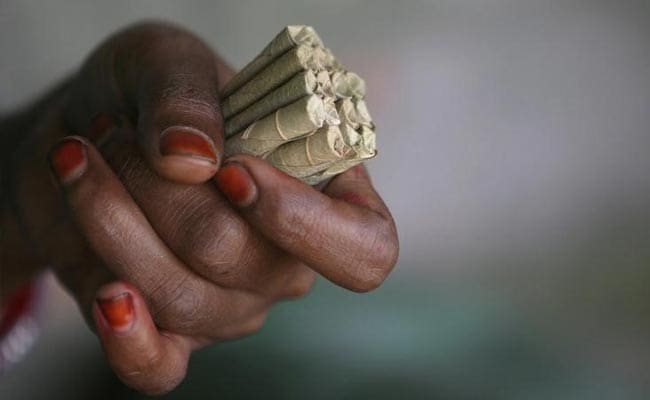
Cigarette companies had closed down factories last week over the new regulation.
Jaipur:
The tobacco industry has sought to delay strict new health warning rules by appealing to the Supreme Court, a move anti-smoking activists say could backfire given that the court has ruled against cigarette makers in the past.
Earlier this month tobacco companies, some backed by "Big Tobacco" firms in the West, effectively went on strike by closing factories in protest against demands that 85 per cent of a cigarette packet's surface be covered by health warnings, up from the older requirement of 20 per cent.
The industry estimates the stoppages cost it as much as Rs 450 crore a day, taking cumulative losses of over Rs 5,000 crore.
Similar battles have played out around the world in recent years as governments try to discourage smoking. On a few occasions, major tobacco producers have resorted to drastic action by freezing output.
That tactic worked in India in 2010, when the government delayed a set of warnings proposed at the time after the industry shuttered plants.
But this time New Delhi's room to compromise is more limited, court documents and interviews with federal health ministry officials and activists suggest, leaving the Supreme Court as one of the last avenues of appeal for cigarette makers.
"The tide has turned and the tobacco industry is on a downhill slope," said one of the activists, Sanjay Seth.

The Tobacco Institute of India, an industry lobby group, declined to comment for this story. It has called the packaging rules drastic and impractical, saying the law will increase smuggling of illegal cigarettes.
One small local producer, Golden Tobacco, has started selling cigarette packs that comply with the new rules.
But the biggest companies - ITC Ltd, part-owned by British American Tobacco, and U.S.-based Philip Morris International's (PMI) India partner Godfrey Phillips - are holding out.
On April 8, an industry group that represents makers of traditional smokes, or beedis, in south India went to the Supreme Court to challenge the rules, according to the filing seen by news agency Reuters on Thursday. It was not previously reported.
The plea, filed by the Karnataka Beedi Industry Association, seeks a stay in enforcing the new rules, saying that they would bring the industry to a "grinding halt" and "cause grave and irreparable harm and loss".
A hearing is scheduled for April 22.
The appeal against the packaging regulations, which are among the world's strictest, does not directly involve major cigarette makers, but any ruling could also apply to them.
ITC declined to comment on the packaging row. BAT said it would be "inappropriate" to comment as they are "just shareholders in ITC". PMI referred questions to Godfrey Phillips, which did not respond to requests for comment.
Earlier this month tobacco companies, some backed by "Big Tobacco" firms in the West, effectively went on strike by closing factories in protest against demands that 85 per cent of a cigarette packet's surface be covered by health warnings, up from the older requirement of 20 per cent.
The industry estimates the stoppages cost it as much as Rs 450 crore a day, taking cumulative losses of over Rs 5,000 crore.
Similar battles have played out around the world in recent years as governments try to discourage smoking. On a few occasions, major tobacco producers have resorted to drastic action by freezing output.
That tactic worked in India in 2010, when the government delayed a set of warnings proposed at the time after the industry shuttered plants.
But this time New Delhi's room to compromise is more limited, court documents and interviews with federal health ministry officials and activists suggest, leaving the Supreme Court as one of the last avenues of appeal for cigarette makers.
"The tide has turned and the tobacco industry is on a downhill slope," said one of the activists, Sanjay Seth.

The Tobacco Institute of India, an industry lobby group, declined to comment for this story. It has called the packaging rules drastic and impractical, saying the law will increase smuggling of illegal cigarettes.
One small local producer, Golden Tobacco, has started selling cigarette packs that comply with the new rules.
But the biggest companies - ITC Ltd, part-owned by British American Tobacco, and U.S.-based Philip Morris International's (PMI) India partner Godfrey Phillips - are holding out.
On April 8, an industry group that represents makers of traditional smokes, or beedis, in south India went to the Supreme Court to challenge the rules, according to the filing seen by news agency Reuters on Thursday. It was not previously reported.
The plea, filed by the Karnataka Beedi Industry Association, seeks a stay in enforcing the new rules, saying that they would bring the industry to a "grinding halt" and "cause grave and irreparable harm and loss".
A hearing is scheduled for April 22.
The appeal against the packaging regulations, which are among the world's strictest, does not directly involve major cigarette makers, but any ruling could also apply to them.
ITC declined to comment on the packaging row. BAT said it would be "inappropriate" to comment as they are "just shareholders in ITC". PMI referred questions to Godfrey Phillips, which did not respond to requests for comment.
© Thomson Reuters 2016
Track Latest News Live on NDTV.com and get news updates from India and around the world

